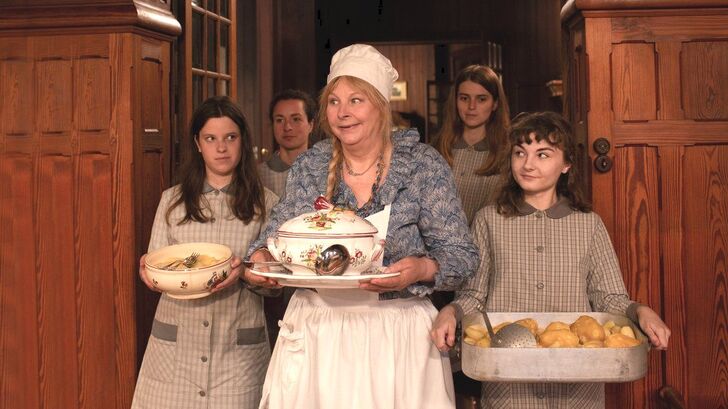Reviewed by GREG KING
Director: Martin Provost
Stars: Juliette Binoche, Yolande Moreau, Noemie Lvovsky, Francois Berleand, Edouard Baer, Lily Taeib, Marie Zabukovec, Anamaria Vartolomei.

France in 1968 underwent a bit of an upheaval, with popular protests and political discord in Paris, combined with a growing awareness of women’s rights and female equality that overturned the existing order. But the impact of this discord took a while longer to reach the provinces.
The film is set in the sleepy rural town of Boersch in the Alsace-Moselle region of France. For decades the Van Der Beck Institute has been a training ground for the daughters of middle-class families, where they have been prepared for married life. The institute reinforces the typical expectations for females in society as it teaches the young women domestic duties – how to cook, clean and become perfect housewives for their husbands. The school is run by the demanding headmistress Paulette Van Der Beck (Juliette Binoche) and her dutiful sister-in-law Gilberte (Yolande Moreau) with the assistance of the authoritarian Sister Marie-Therese (Noemie Lvovsky), a former Resistance fighter who brooks no nonsense from her adolescent charges.
But after her husband Robert (Francois Berleand) dies, Paulette is left to try and run the school and manage the finances. Facing financial ruin due to Robert’s gambling addiction, she turns to local bank manager Andre (Edouard Baer) for assistance. It turns out that Andre and Paulette were once lovers. She thought he had been killed in the war. He looks at this as an opportunity to rekindle his romance and the usually staid Paulette finds her life turned upside down in unexpected fashion.
There are eighteen new students enrolled in the institute for the start of the academic year, but we only get to learn about three of them in any depth. Most of them seems to be outdated gender stereotypes. There is the shy, insecure and awkward Yvette (former model Lily Taeib) who faces her emerging sexuality with nervous anxiety; the intelligent Annie (Marie Zabukovec) who doesn’t want to be constrained by the typical expectations of her gender; and there is the rebellious Albane (Anamaria Vartolomei) whose defiant presence challenges the very nature of the school’s mission.
Director Martin Provost (The Midwife, etc) seems to have a strong empathy for female characters, as evidenced in his many works, and while that aspect comes to the fore here, the film seems largely to be a missed opportunity to probe more deeply into the sexual revolution and the nascent movement towards female liberation. Lighter in tone and mood than many of his previous films How To Be A Good Wife (aka La Bonne Epouse) offers up a mix of farce, romantic comedy and social critique, all delivered with a typically Gallic sensibility.
Provost cowrote the script with Severine Werba (tv series Cannabis), and it has a great premise and plenty of ambition. But it is let down a bit by the clunky execution; many moments fall flat. Provost and Werba seem a little unsure of what they wanted the film to say, and it ends up a bit of a muddled mess. And for no real good reason the whole thing culminates in a clunky Jacques Demy-inspired song and dance number at the end that seems at odds with the rest of the material.
Binoche gets a rare opportunity to demonstrate her comedic chops and she acquits herself well as the increasingly frazzled Paulette who comes to reluctantly embrace her new found independence. She gets strong support from Moreau who makes the most of her role as the introverted and socially awkward Gilberte, while Lvovsky gets to deliver the bulk of the one-liners.
On the positive side, the film looks good thanks to the lensing of cinematographer Guillaume Schiffman (the Oscar winning The Artist, etc) and the sumptuous production design from Camille Bougon-Pigneul.
★★



